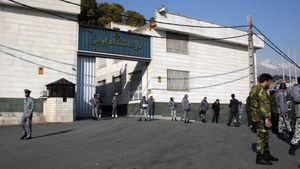Photos by Evan Mulvihill
"All you do is give us rubbers!" shouted ACT UP protesters outside New York City's Department of Health and Mental Hygiene (DOHMH) on the comfortably cool afternoon of Thursday, August 15. "Give us data! Give us numbers!"
Approximately 25 protesters from the long-laboring ACT UP group gathered outside of the DOHMH's Long Island City offices in an effort to force the department to educate the public about Post-Exposure Prophylaxis (PEP) and Pre-Exposure Prophylaxis (PrEP) medication that can prevent at-risk New Yorkers from contracting HIV. ACT UP contends that the DOHMH has failed to collect data on skyrocketing HIV infection rates among the city's young gay men and trans women, accusing the agency of "neglect and fraud" in a bombshell press release.
 Various posters at the protest read "D'OH! I refused to fund PEP. Now 1000's of NYers will get HIV," "The 'Healthcare' Mayor Missed HIV," and "Pozitively FRAUDulent & Absolutely NEGligent."
Various posters at the protest read "D'OH! I refused to fund PEP. Now 1000's of NYers will get HIV," "The 'Healthcare' Mayor Missed HIV," and "Pozitively FRAUDulent & Absolutely NEGligent."
Last month, the group protested outside of Mt. Sinai Medical Center after an alleged incident where emergency-room medical staff did not know how to treat a man who came in asking for PEP after an exposure to HIV. Typically prescribed as thirty daily doses of the antiretroviral drugs Truvada and Isentress, PEP medication is used to prevent HIV infection from taking root in the body after an exposure to HIV, typically in the form of condomless sexual contact with a partner who is HIV-positive or of unknown status. The exact mechanism of PEP is unknown, but Truvada and Isentress are also used to prevent the virus from multiplying in already-infected patients. PrEP is similar to PEP except that it is given prior to possible exposures, typically only to patients who have taken PEP before or who have a history of high-risk sexual behavior, to prevent any exposures to HIV from turning into an actual full-blown infection.
"ACT UP has told DOHMH to start an information campaign to tell New Yorkers about PrEP," writes veteran ACT UP activist Jim Eigo in the release. "Their answer? DOHMH is afraid that such a campaign would create demand for the drugs in advance of a network of doctors equipped to oversee their safe and effective use. What a vicious cycle of ignorance and inaction!"
In an email response to questions from Out magazine, the DOHMH responded to ACT UP's multipronged claims, saying that they are now planning to start an information campaign about PEP and PrEP. "The Health Department plans to expand information about biomedical HIV prevention interventions for at-risk populations, as well as information for clinical providers both on its website and in a format that can be disseminated easily by funded sites," the spokesperson explained, continuing: "In 2013, DOHMH spent $22.4 million on programs specifically for HIV prevention," said a department spokesperson. "Funding supported HIV testing, free female and male condom distribution, treatment adherence for HIV infected persons, biomedical prevention, including PEP for uninsured New Yorkers with clinically appropriate exposures, behavioral risk reduction, syringe exchange, harm reduction, and mental health screening."
When asked pointedly about ACT UP's charge that "DOHMH spends almost nothing on targeted gay HIV testing and prevention," they responded:
In 2011, the Health Department rebid the full HIV testing portfolio, expanding our focus on two categories that prioritize reaching men who have sex with men (MSM), particularly MSM of color.
In 2012, we rebid the bulk of our non-testing HIV prevention contracts, creating an entirely new contract category that prioritizes MSM, primarily young MSM of color. Of the six agencies funding, one (Mount Sinai) is partnering with GMHC, and two (Community Healthcare Network [CHN] and Callen-Lorde) are well known in the community for serving gay men, bisexual men, and transgender women. These agencies provide comprehensive sexual and behavioral health services; including HIV, hepatitis A, hepatitis B, and hepatitis C screening... education and referral for pre-exposure prophylaxis (PrEP), if appropriate; post-exposure prophylaxis (PEP) if appropriate... Another new contract that is beginning this year focuses on addressing the structural issue of familial acceptance of LGBT teens and young adults.... Our rebid portfolio also includes reaching at-risk teens, including gay and bisexual teens in Harlem and upper Manhattan, via text messaging to encourage them to get tested for HIV and STDs and to provide information about how to easily access care.
We also partner with nearly all clubs, bars, and other fixed locations that prioritize serving gay and bisexual men. Of more than 200 sites throughout the city, 95% distribute free condoms supplied by us. This summer, the Health Department continued its participation in all official PRIDE events in all five boroughs, distributing free condoms, lube, and educational materials. We also partnered with at least three agencies that serve gay and bisexual men (APICHA, Community Healthcare Network and Callen-Lorde) to provide free meningitis vaccine at several of these large events.
We have partnered with the CDC, a non-profit agency working with the CDC called FHI 360, and many community partners to extend and expand a testing campaign reaching black gay and bisexual men called 'Testing Makes Us Stronger.'
In response to the overall charges of fraud and negligence, the Health Department stated: "We stand by the favorable results we have achieved in reducing citywide morbidity and mortality associated with HIV and in the quality of our data. Since 2005, we have seen an increase in the proportion of people diagnosed with HIV who are in treatment, a decrease in the number of HIV-related deaths, and an increase in life expectancy for people with HIV. From 2001 to 2011, the number of new HIV diagnoses in New York City declined by 40%."
Dr. Alan Stein, an infectious-diseases specialist who treats many HIV/AIDS patients, said he has attended meetings where the DOHMH has briefed medical professionals on PEP and PrEP. He thinks that condoms still need to be the first line of defense against HIV, as tempting as it may be to push this miraculous medication. "There are groups that are actually not that highly in favor of PEP and PrEP education because of the potential abuses. It has to be given out judiciously," Stein said.
ACT UP's Eigo on the matter added, "It is conceivable that in a few years time condoms will share the frontline duties with a form of PrEP." He went on to explain: "Some of us are hoping that reviving community interest in HIV prevention will foster an honest community discussion about the kind of sex gay guys are having today, and about health and pleasure and how we can maintain both. We hope that conversation might revive a latter-day version of safer sex--smarter sex--that includes: 1) targeted condom use; 2) more extensive HIV testing and early treatment that benefits both the individual and the sexual community he's a member of; 3) verifiable serosorting (positives fuck positives and negatives fuck negatives) and/or seropositioning (negatives top) for anal sex; 4) renewed understanding that there are lots of lower risk sex acts out there (like sucking cock); and 5) pharmaceutical intervention (PEP & PrEP)."
Dr. Stein believes that testing and lowering the overall incidence of HIV is most important. "The way to curb the epidemic is to get more people tested," he said. "Then, once they are tested, getting them into treatment and staying on treatment. If you can do that, that will reduce the community viral load and the risk of transmission. Putting people on PrEP isn't going to do that much to prevent further transmission of the disease. It's more like individual protection. It's not really a public health concept... While PrEP is important, and I do believe in it, I think it's useful in select cases: someone who's going to be compliant and adherent. It shouldn't just be given willy-nilly to people who want to get it."




 Various posters at the protest read "D'OH! I refused to fund PEP. Now 1000's of NYers will get HIV," "The 'Healthcare' Mayor Missed HIV," and "Pozitively FRAUDulent & Absolutely NEGligent."
Various posters at the protest read "D'OH! I refused to fund PEP. Now 1000's of NYers will get HIV," "The 'Healthcare' Mayor Missed HIV," and "Pozitively FRAUDulent & Absolutely NEGligent."

































































